Today, more than 50% of roofing sales are metal tiles - a popular and affordable type of roofing material in regions with a variable climate. Ease of installation, elasticity, reliability make this coating in demand among ordinary consumers, developers and designers. In addition to metal tiles, the roofing market represents other materials - bituminous, flexible tiles and other types.
This article will help you determine which is better metal or shingles.
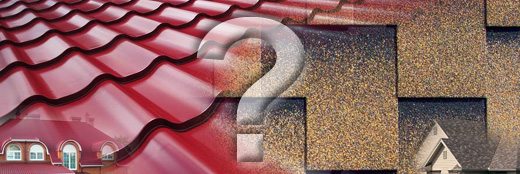
Properties of metal tiles
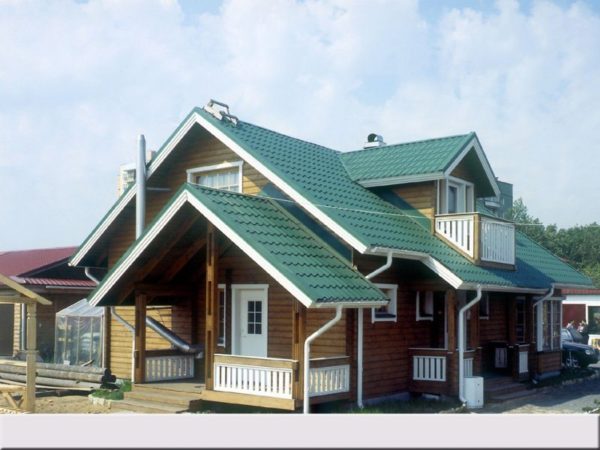
At the beginning of our description, consider the advantages of metal tiles. The metal tile currently available for sale is made on the basis of a profiled steel sheet with a zinc or aluzinc coating with a primer and a polymer material.
The multi-layer coating of metal tiles allows:
- protect the coating from the possibility of corrosion products;
- improve the aesthetic appearance of the roof;
- give the necessary color;
- create an imitation of natural covering on the roof.
Depending on the base material (steel, fiberglass) used for the base of the roofing material, several types of tiles are produced:
- rigid metal tile;
- flexible or soft tiles.
A wide variety of profile shapes and colors makes it possible choose a metal tilesuitable for the design of the house and the surrounding area.
The metal tile also has a different price range, depending on the price of steel sheets, the cost of polymer material. The most affordable polymer coating is polyester, the more expensive one is pural.
Special attention is paid to the operational life of the material, which allows for several decades to protect the roof from climatic influences. Again, when determining a flexible tile or metal tile is optimal for arranging a roof, it is necessary to take into account the disadvantages of this material. The only negatives are rigidity, noise.
Properties of flexible tiles
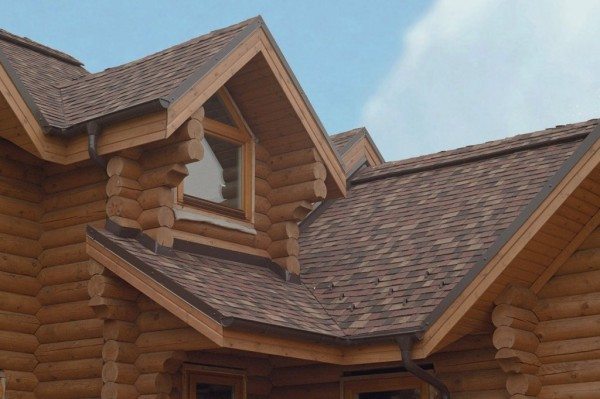
An alternative to a rigid metal tile is a flexible (soft) tile, which is based on fiberglass coated with bitumen. However, when choosing a metal tile or a soft tile, it should be remembered that the flexible coating has a shorter service life.
We have described the properties of the metal tile. In order to compare with other roofing (less rigid), let's focus on the properties of flexible tiles, it is also called soft and bituminous roofing.
The structure of this roofing material is presented in the form of a multilayer coating, which includes:
- fiberglass;
- bitumen;
- stone (basalt) chips;
- adhesive layer.
The basis of flexible tiles - fiberglass provides the coating with strength properties. Stone crumb gives resistance to mechanical damage and UV rays. The adhesive layer determines the tightness of the coating.
When selling flexible tiles, the manufacturer applies a silicone film to the adhesive layer to protect its surface from damage during transportation and storage. If necessary, the film can be easily removed.
No wonder the interest of buyers is riveted to such roofing materials as soft tiles or metal tiles.
The soft cover has the following features:
- flexibility and plasticity, which makes it possible to use this material for roofing with different construction geometry;
- providing waterproofing;
- the possibility of using on the old or new roof of any shape;
- ensuring a minimum amount of waste when installing complex roofs;
- resistance to daily and annual temperature fluctuations;
- ease of installation, without the need for a special tool kit.
In addition to these features, stone-mineral chips provide the material with color fastness, regardless of the harmful effects of the external environment and ultraviolet rays.A variety of colors of this material allows you to choose a flexible tile for any facade design of the house.
Soft tiles on roofing The market is represented by several brands, it belongs to a technological and high-quality roofing product. In the question - metal or bituminous tiles - which is better, construction market experts believe that soft (bituminous) tiles are more promising roofing material. Although the consumer does not always agree with this opinion and prefers rigid steel profiled sheets with a polymer coating.
Comparative series
Each buyer, when choosing a roofing material, relies not only on its properties, but also looks for a more economic solution, including transportation and installation costs. Knowing separately the properties of each material, you can put them in a common comparative series and decide which material suits you best - metal or bituminous tiles.
The material of the two coatings has a different sheet size. Metal tiles can be produced with a length of 1 to 12 m, soft tiles have small shingles. The possibilities of transporting dimensional sheets in their measure influence the choice preference.
In addition, large sheets are used on roofs with a large area, and the bituminous coating fits perfectly on small roofs that have a complex shape. If we touch on the economic side of the issue. The use of sheets with large dimensions on rooftops with a complex architectural form gives more waste.
The profile of the metal tile is characterized by:
- form;
- color;
- sheet thickness;
- type of applied polymer;
- wave height.
The flexible tile has a variety of colors and geometries, but has a flat shape, 3 mm thick. Both materials are lightweight, so installing them on the roof does not require the installation of a reinforced truss system.
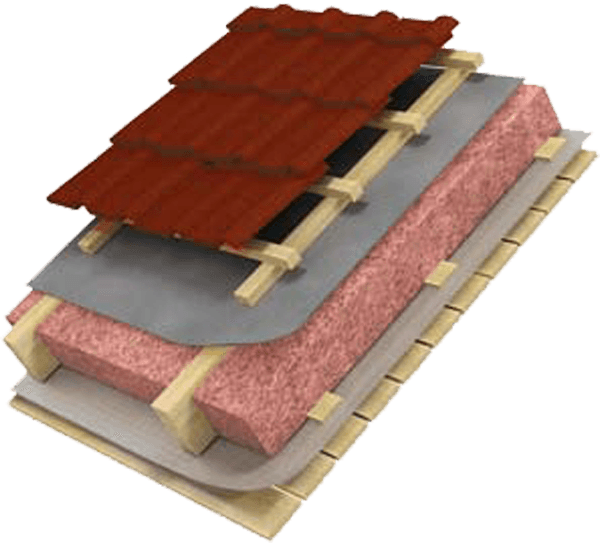
The installation of these materials is quite simple.
The difference lies in the technology of its execution:
- Under the metal tile, it is necessary to mount the crate. In some cases, it can be laid on the old roofing. Fastening is carried out with self-tapping screws at 6-12 points in the deflection of the wave;
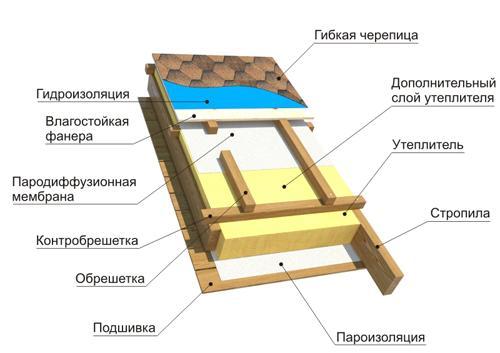
- Flexible tiles are laid on a solid base of moisture-resistant plywood. Fastening is carried out with mounting nails. At the same time, each element of soft tiles is laid in such a way that the sheets lying above hide the fasteners, thanks to this method of fastening, the coating has an ideal surface.
Both roofing materials have a different warranty period (for bituminous tiles - up to 25 years, for metal tiles - up to 12 years). But the service life of these coatings depends on the quality of installation, which affects the tightness of the roof and its ventilation properties. Regardless of whether bituminous tiles or metal tiles are used on your roof, you must comply with technological requirements during installation work.
The operational properties of these coatings are almost similar:
- waterproofing;
- resistance to natural influences.
But the metal tile shows itself better in conditions of sudden temperature changes. In addition, its water absorption is 0%, and for soft tiles - 10%. This is the reason for the use of a moisture-resistant material as a base.
Bituminous roofing, unlike a metal coating, is not grounded, as it has a low electrical conductivity. However, in terms of fire resistance, metal tile wins.
Due to the softness of the material, bituminous tiles have good sound insulation, while metal tiles require sound insulation due to the creation of the “drum” effect during hail and rain. In terms of resistance to aggressive components, metal tiles are more effective, but bituminous roofing is more durable when exposed to impacts.
Attention. The main question in the device of a metal roof is resistance to corrosion.
The weak point of the metal tile is the attachment points, where, as a result of drilling, the protective coating is broken.
You can point out many more comparisons, but in conclusion everyone would like to say that both metal tiles and roofing made of soft tiles perform their functions, provided that the subtleties of installation are observed. Both coatings are decorative, modern, their manufacturability is at a high level.
Did the article help you?
